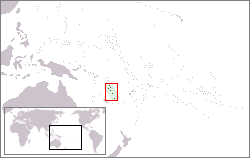Vanuatu
The Republic of Vanuatu is a country located in the South Pacific Ocean. The archipelago is located some 1,750 km east of Australia, north-east of New Caledonia, west of Fiji and south of the Solomon Islands.
| |||||
| National motto: Long God Yumi Stanap (Bislama: We stand before God | |||||
 | |||||
| Official languages | Bislama, English, French | ||||
| Capital | Port Vila | ||||
| President | John Bani | ||||
| Prime Minister | Edward Natapei | ||||
| Area - Total - % water | Ranked 156th 12,200 km² Negligible | ||||
| Population
- Density | Ranked 172nd
16/km² | ||||
| Independence | July 30, 1980 | ||||
| Currency | Vatu | ||||
| Time zone | UTC + 11 | ||||
| National anthem | Yumi, Yumi, Yumi | ||||
| Internet TLD | .VU | ||||
| Calling Code | 678 | ||||
History
Main article: History of Vanuatu
Many of the islands of Vanuatu have been inhabited for thousands of years, the oldest evidence found dated 2000 BC. The first European explorer to reach the islands was Spaniard Pedro Fernández de Quiros in 1606. After James Cook also visited the islands in the late 18th century, Europeans started to settle on the islands.
In 1906, the French and British agreed to an Anglo-French Condominium on the New Hebrides, as the islands were then known. In the 1960s, the Vanuatuan people started to press for self-government and later independence, which was finally granted by both European nations on July 30, 1980.
During the 1990s, Vanuatu experienced some political instability, which eventually resulted in a more de-centralised government.
Politics
Main article: Politics of Vanuatu
The parliament of Vanuatu is unicameral, and has 52 members. These are elected every four years by popular vote. The leader of the main party in the parliament is usually appointed prime minister, and heads the government. The chief of state, the president, is chosen by the parliament and regional councils every five years.
Provinces
Main article: Provinces of Vanuatu
Vanuatu has six provinces:
Geography
Main article: Geography of Vanuatu
Vanuatu consists of 83 islands, of which two - Matthew and Hunter - are also claimed by the French oversea department of New Caledonia. Most of the islands are mountainous and of volcanic origin, and have a tropical or sub-tropical climate.
The nation's largest towns are the capital Port Vila, which is situated on Efate, and Luganville, on Espiritu Santo.
Economy
Main article: Economy of Vanuatu
The economy is based primarily on subsistence or small-scale agriculture, which provides a living for 65% of the population. Fishing, offshore financial services, and tourism, with about 50,000 visitors in 1997, are other mainstays of the economy. Mineral deposits are negligible; the country has no known petroleum deposits. A small light industry sector caters to the local market. Tax revenues come mainly from import duties. Economic development is hindered by dependence on relatively few commodity exports, vulnerability to natural disasters, and long distances from main markets and between constituent islands. A severe earthquake in November 1999 followed by a tsunami, caused extensive damage to the northern island of Pentecote and left thousands homeless. Another powerful earthquake in January 2002 caused extensive damage in the capital, Port-Vila, and surrounding areas, and also was followed by a tsunami. GDP growth rose less than 3% on average in the 1990s. In response to foreign concerns, the government has promised to tighten regulation of its offshore financial center. In mid-2002 the government stepped up efforts to boost tourism. Australia and New Zealand are the main suppliers of foreign aid.
Vanuatu is a tax haven that doesn't release account information to other governments and law enforcement agencies. In Vanuatu there is no income tax, no withholding tax, no capital gains tax, no death duties and no exchange controls.
Demographics
Main article: Demographics of Vanuatu
Most of the inhabitants of Vanuatu (95%) are native Melanesian, or Ni-Vanuatu, with the remainder made up of Europeans, Asians and other Pacific islanders. There are three official languages in Vanuatu, English, French and Bislama, which is a pidgin of English. In addition over a hundred local languages are spoken on the islands.
Christianity is the predominant religion in Vanuatu, although there are a lot of denominations. The Presbyterian Church, adhered by about one third of the population, is the largest of them.
Culture
Main article: Culture of Vanuatu
Miscellaneous topics
- Communications in Vanuatu
- Transportation in Vanuatu
- Military of Vanuatu
- Foreign relations of Vanuatu
